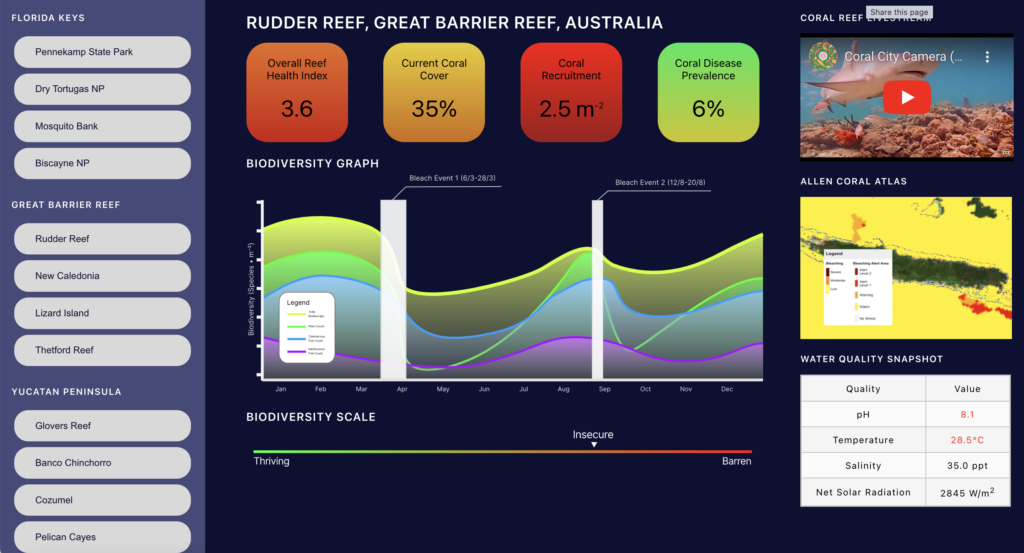Engineering student team designs novel sensor to protect coral reef health, wins IBM Call for Code Challenge
Two Michigan Engineering undergraduate students, computer science major Angelina Ilijevski and industrial and operations engineering major Andres Ramirez, have won first place in Round One of the IBM Call for Code Global Challenge for BlueReef, a proposed sensor system that provides real-time, on-site monitoring of coral reef health.
The IBM Call for Code Global Challenge is an international competition that brings together top thinkers and problem solvers from across the world to build solutions “that address specific global sustainability challenges in clear and unique ways.” In its sixth year, Call for Code is the largest and most prominent “tech-for-good” initiative, inviting innovative minds from universities, startups, corporations, and beyond to take on some of the globe’s most pressing humanitarian, social, and environmental issues.
Ilijevski and Ramirez’s winning submission consists of a sensor system and accompanying coral reef index built on complex data analysis and machine learning models. Their models take into account several factors involved in coral health. “The idea is to collect as much information as possible about the water and the ecosystem,” said Ilijevski. “That includes pH level, water temperature, and basically any measurement we can collect that’s feasible.”
Their sensor solution represents a considerable advance over existing monitoring tools that require more human intervention, making deployment and scaling more practical. The system also collects more data than traditional methods, providing for a fuller, more accurate picture of coral reef conditions.
“BlueReef addresses the critical immediate problem of coral bleaching,” said Ramirez, “and it provides a low-cost solution that would greatly expand the access researchers, governments, and nonprofits have when it comes to monitoring and protecting our ocean’s coral reefs.”
Coral reefs are a vital component of the natural world; they support a quarter of all ocean fish and protect shorelines from waves, currents, and storms. The protection of these ecosystems is therefore essential to marine and, by extension, human health.
Ilijevski and Ramirez’s innovative BlueReef sensor system comes at a particularly opportune time, with many of the world’s coral reefs under severe threat. Stress caused by natural and human causes, including disease, pollution, and warming waters, can seriously damage reefs, leading to bleaching and even death. Mass bleaching events are not uncommon; NOAA estimates that one such event affected 75% of the world’s coral reef ecosystems at its peak from 2014 to 2017.
Key to preventing and addressing coral reef damage is accurate and timely monitoring, an objective directly served by Ilijevski and Ramirez’s newly proposed technology. Their sensor system not only provides continuous measurements of various factors influencing reef health; it is also an environmentally friendly solution that does not interfere with the ecosystem or require regular human intervention.
“We set out to find a new, more efficient way to improve coral reef health that does not disturb the rest of the ecosystem,” said Ilijevski. “Our sensor comes in the form of an artificial coral, so we can place it directly onto the reef in virtually any region.”
After the artificial coral sensor is placed, it collects a host of data about the environment. These measurements are then loaded into a database as a basis for determining the health of the coral reef using state-of-the-art computing techniques. “We use machine learning models to work with the data and analyze the coral reef metrics to calculate how healthy they are.”
The team’s machine learning equations make predictions about the expected values for various coral reef health factors and then feed these predicted values into their originally crafted coral reef index equation to generate a single measure for coral reef health. This value represents a reef health “score,” measured on a scale of one to five, allowing users to quickly and easily assess reef conditions at any given moment.
This data, including both the coral reef index score as well as individual measurements, are displayed on the BlueReef online dashboard. This dashboard synthesizes the data analysis results into a presentable and easy-to-digest format, serving as an accessible tool for those seeking to monitor coral reef health.

“Our aim is to help nonprofits, companies, and others interested in protecting coral reef ecosystems easily determine which coral reefs are most in need or most at risk of bleaching,” said Ilijevski. “We want to make the process of identifying these at-risk reefs easier, as well as determining which factors have the greatest impact on coral reef health.”
For Ilijevski and Ramirez, their BlueReef journey is far from over. As winners of the first of four total rounds of the Call for Code competition, they will go on to be considered alongside the winners of the three subsequent rounds for the challenge’s Grand Prize.
The team is also in the beginning stages of building a prototype of their sensor system in order to conduct further tests and finetune their models. They then hope to turn it into a deployable technology that other researchers and conservationists can use to monitor and protect coral reefs around the world.
“We would love to see BlueReef implemented alongside coral reefs throughout the world,” said Ramirez. “ I hope it compels governments and nonprofits to take action to protect coral reefs, but more importantly I hope it will help to advance coral reef research.”
 MENU
MENU 
